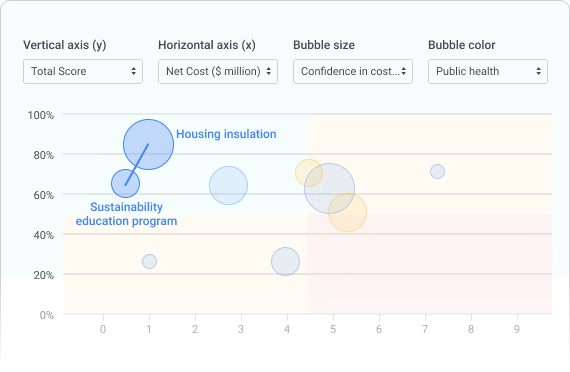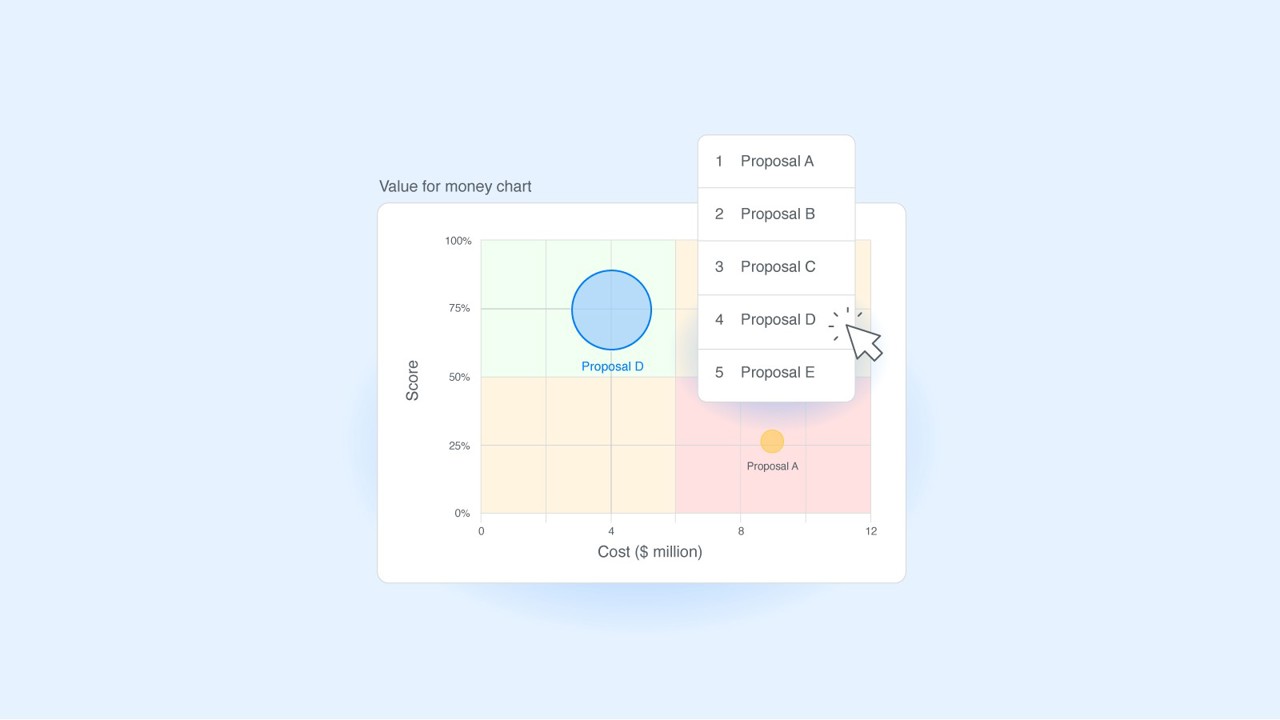Press Release, 1 May 2009
1000minds released today a new version of their award-winning decision-support software. The new version includes tools to help private sector and government decision-makers get better ‘value-for-money’ when allocating scarce resources across competing alternative uses.
1000minds, which runs on the Internet, guides decision-makers through a simple process to arrive at their weights for the decision criteria used to prioritize the alternatives they are considering. The alternatives are scored according to the criteria and weights and then they are ranked (prioritized) by their ‘total scores’.
The new version of 1000minds released today allows users to explicitly compare the alternatives’ total scores (representing their ‘value’) against their prices/costs (or resource requirements, more generally). This is graphically represented via 1000minds’ new charting feature (see the example on the next page). This enables decision-makers to think more carefully about the value-for-money of the alternatives, and to allocate their budgets accordingly.
1000minds CEO and Director Dr Paul Hansen said the company developed the new tools with the current recession in mind, and the government’s declared pursuit of ‘high-quality’ public sector expenditure, as well as recent high-profile decisions such as by the Dunedin City and Otago Regional Councils to fund the Dunedin Stadium.
“Especially now when available resources and budgets are even more stretched than usual, wringing as much value-for-money from spending decisions is very important. We created the new tools to help with making such decisions in a more systematic and transparent fashion, and in a way that can be easily communicated to all stakeholders.”
Obvious potential users of the new tools include government agencies deciding how best to spend their budgets, and city or regional councils prioritizing projects in their annual plans. Other users could include businesses investing in new initiatives, community trusts deciding which community projects to support, research funders (eg. Health Research Council) allocating research money, and District Health Boards prioritizing their budgets (eg. Swine Flu preparations versus more elective surgery).
“The overall objective is to help decision-makers maximize the bang-for-buck from scarce resources”, says Hansen. “We believe our new tools will help achieve this.”
Background information about 1000minds
Invented by Franz Ombler and Paul Hansen, 1000minds grew out of research started in the 1990s at the University of Otago into methods for prioritizing patients for surgery. Ombler and Hansen discovered a new approach to the universal problem of how to combine alternatives’ characteristics on multiple criteria – based on decision-makers’ preferences – in order to rank the alternatives. 1000minds has one Australian and two New Zealand patents, and US and Canadian patents are pending.
1000minds won the Telecommunications Users’ Association of New Zealand (TUANZ) Healthcare Innovation Award in 2005, a Consensus Software Award in 2007, and was a finalist for four other national and international innovation awards, most recently a Bayer Innovators Award in 2008. 1000minds has customers in New Zealand, Canada and the UK, and academic users around the world.
Example of a 1000minds ‘Value-for-Money’ Chart

To better appreciate this approach to decision-making, look at the chart and ask yourself:
- “Which alternatives (represented by bubbles – where their size, potentially, represents a third consideration, eg. ‘robustness of funding requests’) are the best value-for-money?”
- “If you were allocating a fixed budget (eg. $500,000), which alternatives would you include in your ‘portfolio’ of preferred alternatives?”
For more information, please contact
1000minds Ltd
website: www.1000minds.com
phone: +64 3 974 8270
email: team@1000minds.com
Get the best value for money for your projects
1000minds’ powerful conjoint analysis and decision-making tools give your organization a complete, auditable process for discovering people’s preferences and making fair and transparent decisions. The ‘secret spice’ behind our innovative approach is our award-winning, patented PAPRIKA method, which makes the process simple, smart and fun!
Curious about how 1000minds can help you? Sign up for our free trial or book a demo with our friendly team today.
Share this post on:

